Summary
- 1 Mythological role of Hades
- 2 Jungian archetypes explained
- 3 Hades as the Shadow of Self
- 4 Symbols of Hades
- 5 Repressed desires and fears
- 6 Ades and Personal Growth
- 7 The power of integration
- 8 Unveiling Forgotten Memories
- 9 Latent potential in the unconscious
- 10 Transformational Journeys
- 11 Frequently asked questions
- 11.1 How does Hades influence modern psychological practices?
- 11.2 What is the significance of Hades in contemporary culture?
- 11.3 How can you identify the Hades-like traits in your personality?
- 11.4 Are there modern therapies that focus on the Hades archetype?
- 11.5 What are the common misconceptions about Hades in psychology?
Ades, the Greek god of the underworld, is the ultimate archetype of the unconscious. He rules hidden worlds filled with secrets, buried treasures and souls of the dead. In psychology, Ades represents the shadow, the enigmatic aspects of your psyche that you have neglected or repressed. By exploring the domain of Ades, you face your hidden fears, desires and unresolved emotions. Embracing this inner darkness can lead to personal growth and self-awareness. If you are curious about how discovering these hidden parts of yourself can transform your life, there is much more to discover.
Mythological role of Hades
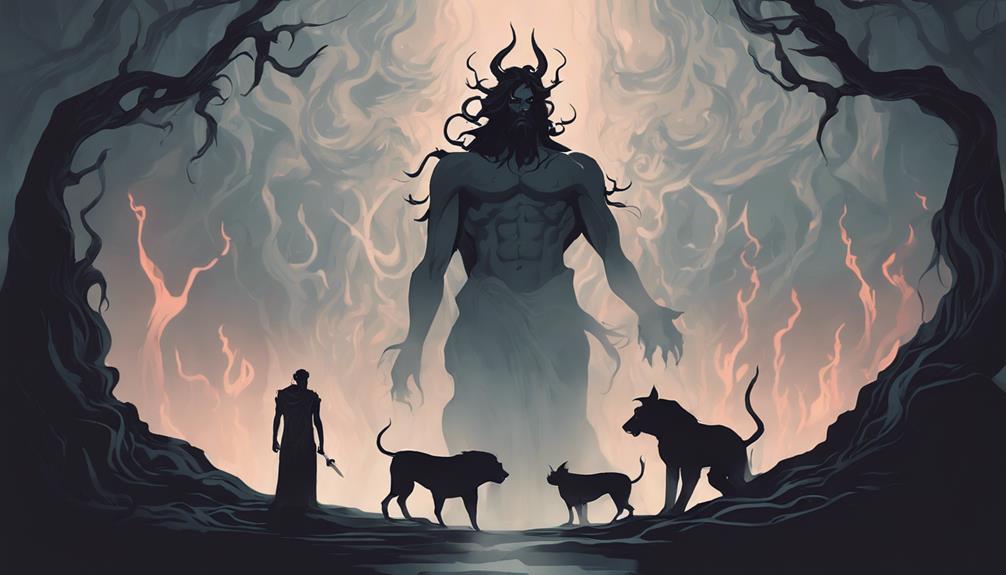
Hades, in Greek mythology, is not only the god of the underworld; he is the ruler of the hidden domains of the unconscious. When you think of Hades, imagine a figure who oversees the dark territories that lie beneath the surface of our everyday awareness. Unlike the other gods who dwell on Olympus, the realm of Hades is a place of mystery and depth, where the souls of the dead reside.
You might be interested to know that Hades' role extends beyond just the domain of the dead. He is also responsible for all things buried underground, including precious metals and hidden treasures. This makes him a guardian of the secrets and riches that lie beneath the earth's surface. Upon reflection, it becomes clear why Hades is so closely associated with the unconscious mind, where hidden thoughts, feelings and desires reside.
Understanding the mythological role of Hades helps you grasp how he embodies the concept of the unconscious. He is not just a dark figure of death, but a symbol of the unknown parts of ourselves that we often overlook or ignore. By delving into Hades' domain, you can gain perspectives on the depths of your own psyche.
Jungian archetypes explained
In Jungian psychology, the archetypes are the universal symbolic images and themes that arise from the collective unconscious and shape human experiences and behavior. These archetypes are deeply embedded in our minds, influencing the way we perceive the world and interact with it. They are like ancient patterns for understanding the complexities of life.
You will find that these archetypes manifest themselves in various forms, three of which are:
- The hero: This archetype symbolizes courage, valor, and the quest for self-discovery. Think of characters like Hercules or modern superheroes.
- The wise elder: Representing wisdom and guidance, this figure often appears in stories as mentors or sages, such as Gandalf from 'The Lord of the Rings.'
- The trickster: Known for cunning and spitefulness, this archetype disturbs the status quo by challenging norms and expectations. Loki of Norse mythology is a classic example.
Understanding these archetypes helps you recognize patterns in your own life and in the lives of others. By identifying these symbolic themes, you can gain deeper insight into your behaviors, motivations and even your dreams. Jung believed that accessing these archetypes promotes personal growth and self-awareness.
Hades as the Shadow of Self
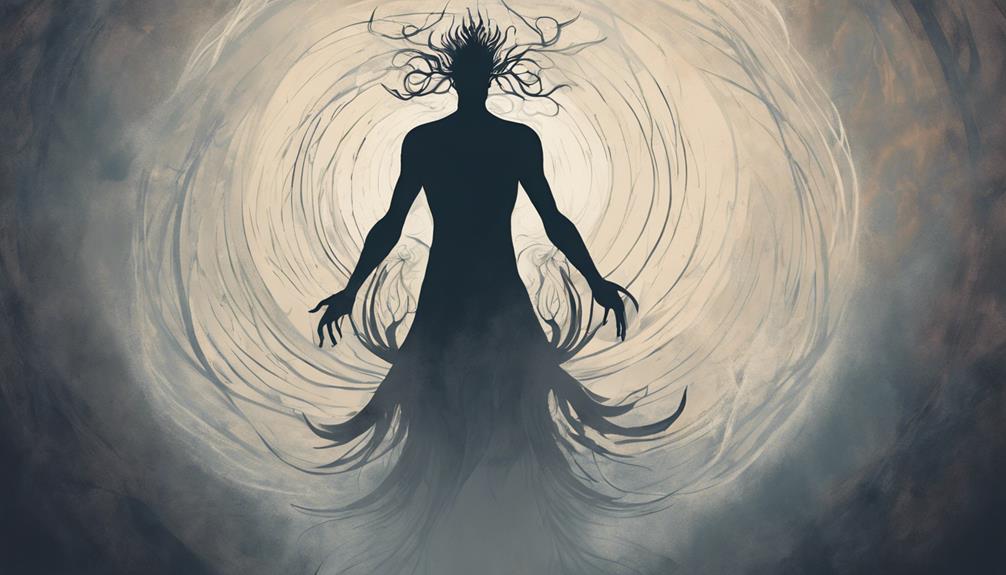
When you think of Hades, you are actually touching on the symbolism of theinterior shadow - Those hidden parts of your psyche. Investigating these psychological depths can be both challenging and enlightening. By integrating your shadow, you reveal a more complete understanding of who you are.
Symbolism of Hades
Many myths and stories show Hades as a powerful shadow symbol, representing the parts of our psyche that we often keep hidden. When you think of Hades, you are delving into the depths of the unconscious mind. This is not just about fear or darkness; it is about understanding the unseen aspects of yourself. Hades embodies the parts of you that might be uncomfortable to deal with but are essential for personal growth.
Consider these elements when you think of Hades as your shadow:
- Repressed Desires: These are the impulses and desires that you might not recognize but still influence your behavior.
- Hidden Talents: Sometimes, the shadow hides potential strengths and abilities that you have not yet discovered.
- Unresolved Emotions: Feelings such as anger, jealousy or sadness that you reject may reside in your shadow.
Psychological depths explored
Understanding the symbolism of Hades helps you appreciate the psychological depths it represents as theshadow. Hades is not just an otherworldly god; he embodies the parts of yourself that you may not want to acknowledge. These hidden aspects, often referred to as the 'shadow,' are fundamental to the personal growth.
Think about the emotions and desires you tend to repress - anger, jealousy or fear. These are your shadow elements. Hades helps you deal with these inconvenient truths. By delving into these psychological depths, you gain a more complete understanding of who you are. This journey can be unsettling, but it is necessary to achieve a balanced psyche.
Hades also symbolizes mystery and the hidden wisdom. When you explore your shadow, you discover not only dark traits but also unexpressed potentials and strengths. It is like finding treasure in a dark cave. By understanding your shadow, you learn valuable lessons about resilience and the self-knowledge.
Integration of the Shadow
Integrating your shadow self, represented by Hades, means embracing the parts of you that you have been avoiding. This process involves recognizing aspects of your personality that you may find uncomfortable or even shameful. By doing so, you bring these hidden elements into the light, allowing you to have a more complete and balanced self.
To begin, consider these steps:
- Self-reflection: Take time to reflect on your thoughts and behaviors, especially those you usually suppress or ignore.
- Acceptance: Accept that these darker aspects are part of you. They do not define you, but recognizing them is essential.
- Transformation: Use this new awareness to transform your shadow traits into positive attributes. For example, turn anger into motivation or creativity.
When you integrate your shadow, you will access a reserve of potential and strength that you have probably underestimated. Hades, as god of the underworld, symbolizes not only death and darkness but also the untapped resources that lie beneath the surface. By facing your shadow, you will discover a more authentic and emancipated version of yourself. Embrace this journey; it is a path to wholeness and self-discovery.
Symbols of Hades
When you think of theOtherworld, three main symbols come to mind: rivers, mythical guardians, and gates. Each of these elements plays an essential role in shaping the eerie and mysterious aspect of the realm. We investigate how they contribute to the dark charm Of the Underworld.
Rivers of the Underworld
The rivers of the otherworld, each with its own unique symbolism, reveal the depths of the human unconscious and internal complexities. These rivers do not just represent physical barriers; they symbolize emotional and psychological states that you may cross in your life.
- Styx: The river of hatred and the boundary between the living and the dead. Crossing the Styx is about confronting your deepest fears and unresolved conflicts. It is about facing what you would rather avoid.
- Lete: Known as the river of forgetting. Drinking from Lete symbolizes the desire to forget past traumas or painful memories. It is a reminder of the human tendency to bury the past rather than face it.
- Acheron: The river of sorrow or misfortune. It represents the feeling of sadness and loss. When you think of the Acheron, consider how grief can be both a burden and a path to deeper understanding.
Each river acts as a mirror, reflecting parts of your inner world. By understanding these symbols, you are better equipped to navigate through your emotional and psychological landscapes. Otherworldly rivers are not just mythical elements; they are gateways to self-awareness and personal growth.
Mythological Guardians and Gates
Standing as formidable sentinels, mythical protectors e entrances to the afterlife symbolize the limitations and challenges you face on the journey of self-discovery. These figures are not just characters from ancient stories; they represent the trials and obstacles you face as you delve into your unconscious mind.
Cerberus, the dog three-headed, guards the entrance to the Underworld. It is a reminder that entering the depths of your psyche is not easy. You must confront your fears and doubts, just like the heroes of the legends who had to trick or overpower Cerberus in order to proceed.
The doors themselves, often depicted as imposing and grand, signify the threshold between the known and the unknown. To pass through these entrances is to leave your comfort zone And enter a domain where you will face Inner turbulence and hidden aspects Of yourself.
Each guardian and door you encounter in the myths symbolize a different part of your inner world. They challenge you to grow, to confront what you have buried deep within. By understanding and overcoming these symbolic protectors, gain insight and strength, bringing you closer and closer to a more complete and integrated self.
Repressed desires and fears
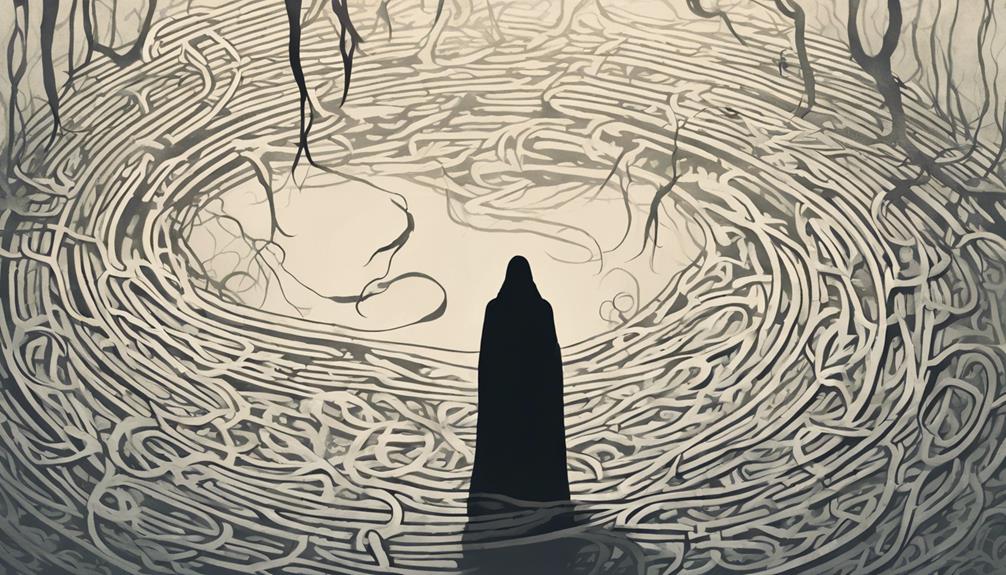
Deep within the shadows of your mind, repressed desires and fears lurk, influencing your actions and emotions in ways you may not realize. These hidden aspects of your psyche often stem from past experiences, societal expectations or inner conflicts that you could not fully process at the time. Just like Hades, the invisible ruler of the underworld, these elements remain out of sight but are powerful.
You may wonder how these repressed parts of yourself manifest themselves in daily life. Here are some ways:
- Sudden emotional reactions: Have you ever wondered why you overreact to certain situations? It could be a repressed fear bubbling to the surface.
- Dreams or nightmares recurring: These may be clues from your subconscious, trying to bring up repressed desires or fears.
- Unexplained anxiety or discomfort: Feeling restless for no clear reason could be a sign of something hidden inside you.
Ades and Personal Growth
Venturing into the realm of Hades can lead you to embrace your inner darkness, which is essential for personal development. By facing challenges directly, you are able to evolve and emerge stronger. Embracing your dark side enables you to become a more complete and balanced individual.
Embracing the inner darkness
When you face your inner shadows, you often discover hidden strengths and deep personal development. This process, though challenging, can be incredibly rewarding. Hades, as an archetype of the unconscious, represents those parts of ourselves that we may fear or avoid. By recognizing these aspects, you begin a journey of self-discovery that can lead to significant changes.
This is how you can effectively accept your inner shadows:
- Recognize Your Fears: Recognize what you fear most about yourself. These fears often hold the key to your growth.
- Reflect on Past Experiences: Understand how past experiences have shaped your current behaviors and thoughts. This reflection helps you see patterns and triggers.
- Practice Compassion toward Yourself: Be kind to yourself as you navigate these hidden parts. Compassion toward yourself creates a safe space for growth.
Transformation through adversity
Facing adversity can be a powerful catalyst for personal growth, just as Hades symbolizes transformation through the unconscious. When you are faced with challenges, it is easy to feel overwhelmed or lost. However, these difficult moments can also be opportunities for meaningful change. Just as Hades rules the underworld, diving into your problems can reveal hidden forces and foster resilience.
Consider how adversity affects your life:
| Adversity | Immediate feelings | Potential growth |
|---|---|---|
| Loss of a loved one | Pain, sadness | Increased empathy |
| Loss of employment | Fear, uncertainty | New career opportunities |
| Breakup of a relationship | Sorrow, loneliness | Stronger personal identity |
| Health problems | Anxiety, frustration | Appreciation for well-being |
| Financial difficulties | Stress, insecurity | Improved budgeting skills |
You will find that by facing your difficulties, you can bring out parts of yourself you didn't know you had. Each row in the table above shows how initial pain can lead to valuable personal understandings. Embracing these experiences, just like Hades' domain, can transform your inner world. Remember, it is through darkness that you often discover light.
Integration of the Ego Shadow
Often, integrating your shadow, just like understanding the realm of Hades, is essential for personal growth. You may think of your shadow as the parts of you that you hide or neglect. These aspects can be challenging but hold the key to becoming a more complete individual. By embracing your shadow, you bring light to the hidden parts of your psyche and enable transformation.
To begin integrating your shadow, consider these steps:
- Self-awareness: Recognize the traits and behaviors that you often deny or suppress. This step involves honest self-reflection.
- Acceptance: Embrace these parts of yourself without criticism. Understanding that everyone has a shadow can make this process easier.
- Expression: Find healthy ways to express and channel these hidden aspects. This could be through art, writing or talking to a friend about trust Or a therapist.
Facing your shadow, much like facing Hades in mythology, can seem challenging. However, doing so allows you to gain a deeper understanding of who you are. It is in this darkness that you find the potential for growth, wisdom and true personal transformation. Don't back away from it. Embrace it.
The power of integration
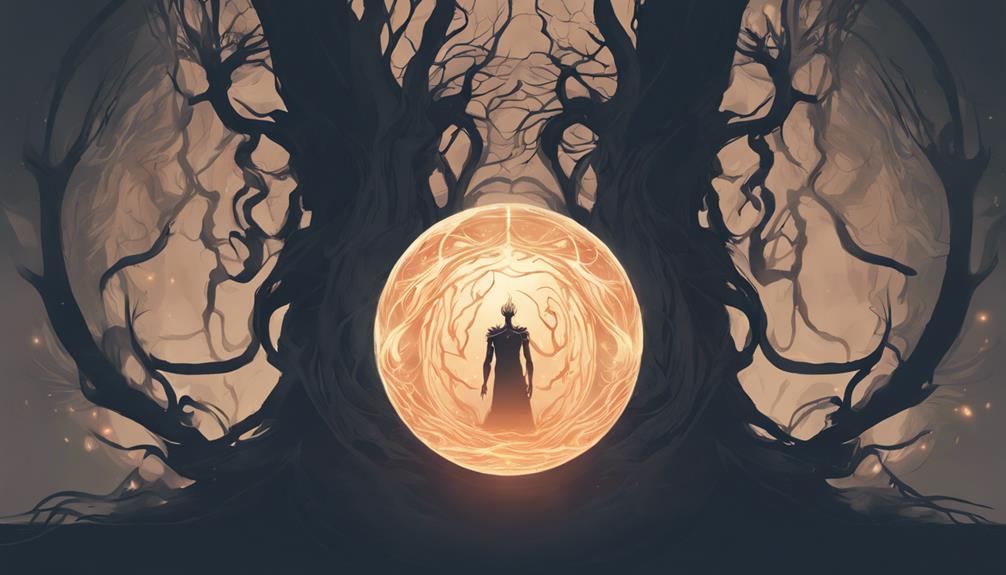
Integrating the shadow aspects of Hades into your consciousness can lead to profound personal growth and self-awareness. When you welcome these darker elements, you are not just acknowledging them; you are learning from them. This process allows you to confront fears, hidden desires and unresolved conflicts that you may have buried deep within.
By addressing these parts of yourself, you gain a clearer understanding of who you are and what motivates you. It is like illuminating the hidden corners of your mind, revealing aspects that, when integrated, can make you whole. You will find that this integration brings a sense of balance and inner peace as you are no longer at odds with parts of yourself.
In addition, integrating the shadow aspects of Hades helps you develop resilience. When you understand your depths, you are better equipped to face life's challenges. You become more grounded and less inclined to be sidetracked by external events.
In essence, the power of integration lies in its ability to transform you. It is a journey of self-discovery that enables you to live authentically and harmoniously. Embrace this process and you will discover profound personal growth.
Unveiling Forgotten Memories
Revealing buried memories can be like opening a treasure chest hidden deep in your mind. These memories, tucked away, often hold keys to understanding your current behaviors and emotions. As you reopen these forgotten moments, you may experience a range of emotions from joy to sadness, but each offers valuable understandings.
In diving into neglected memories, you might notice:
- Patterns and triggers: Identifying recurring themes can help you understand what influences your reactions.
- Connections with the present: Realizing how past events shape current feelings and actions can foster personal growth.
- Emotional outburst: Processing these memories can lead to a sense of relief and clarity.
Interacting with these memories requires patience and courage. You may find it helpful to keep a journal, talk to a psychotherapist, or explore creative outlets such as art or music. These methods can make the process more manageable and less overwhelming. Remember, this journey is about self-discovery and healing. By revealing forgotten memories, you are not just looking back; you are also paving the way for a more conscious future. Embrace this process, as it can lead to profound personal transformation.
Latent potential in the unconscious
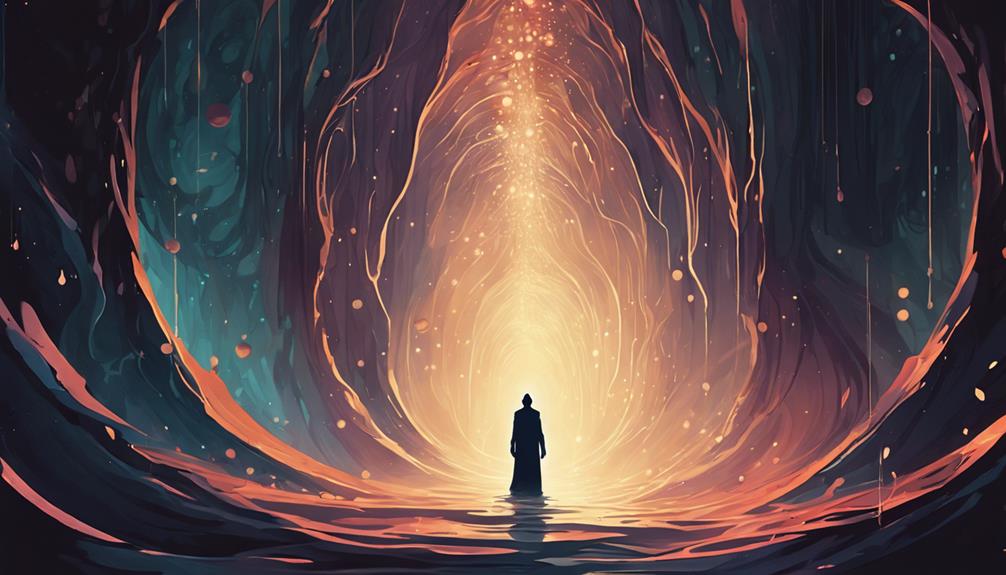
Revealing the dormant potential in your unconscious can reveal hidden talents and strengths you didn't even know you had. Imagine a vast unexplored sea beneath your daily thoughts. This sea is filled with treasures waiting to be discovered. Sometimes, life's distractions prevent you from diving deep into this reservoir of unexpressed abilities.
Your unconscious mind is like a safe deposit box. It is where repressed memories, forgotten skills and unexplored passions reside. By taking the time to explore this space, you can discover skills that can change the way you perceive yourself and what you believe you can accomplish. The process could involve meditation, therapy, or simply introspection-any method that helps you look inside yourself.
You may discover that you have a talent for art, a knack for solving intricate problems, or an unsuspected leadership quality. These revelations can be powerful. They help you realize that you are capable of more than you previously believed. And the best part? This hidden potential is distinctly yours, shaped by your experiences and your inner world. So, don't hesitate to explore your unconscious. You never know what extraordinary talents you might discover.
Transformational Journeys
Embarking on a transformative adventure can change the way you see yourself and the world around you. It involves a deep exploration into the unknown, often guided by the archetype of Hades, the lord of the unconscious. This adventure is not just about confronting your fears; it is about embracing them and discovering the hidden parts of yourself that hold immense potential.
When you set out on this path, you might find:
- Self-discovery: You will discover facets of your personality that you never knew existed.
- Healing: Facing and accepting your shadows can lead to emotional and psychological healing.
- Growth: Facing challenges directly enables personal growth and resilience.
These experiences are crucial to understanding the subconscious influences that shape your actions and thoughts. Guided by Hades, this adventure encourages you to confront your inner darkness, not as an enemy, but as a wise teacher. In this way, you learn to integrate these shadow aspects into your conscious life, nurturing a more complete and harmonious self.
Frequently asked questions
How does Hades influence modern psychological practices?
You are probably wondering how Hades influences modern psychology. Well, Hades symbolizes the unconscious mind, which is fundamental to understanding behaviors and emotions. Psychologists use this concept to investigate entrenched issues That people are unaware of. By exploring the 'underground' of your mind, they help reveal fears and hidden desires, leading to greater self-awareness and healing. It is like discovering a mysterious part of yourself.
What is the significance of Hades in contemporary culture?
Hades in contemporary culture symbolizes the essential and mysterious aspects of life. You will find its influence in literature, movies and even video games, representing the unknown and the unconscious. This archetype helps you discover deeper themes such as death, transformation and hidden fears. By interacting with these themes, you gain a better understanding of yourself and the world around you, making Hades a crucial figure in current narratives.
How can you identify the Hades-like traits in your personality?
To identify Hades-like traits in your personality, look for signs of introspection, a strong connection to the unconscious mind and comfort with solitude. You may find that you are drawn to deep, transformative experiences and have a natural ability to navigate through life's darkest moments. People with these traits often have mysterious or secretive behavior and value privacy. Pay attention to how you deal with change and emotional depth.
Are there modern therapies that focus on the Hades archetype?
Yes, there are modern therapies that focus on the Hades archetype. The Jungian therapy Is one of them. You will explore your unconscious mind and the hidden aspects of your personality. Also the psychology in depth and the shadow work Deepen these themes. These methods help you understand and integrate the darker parts of yourself, promoting healing and self-awareness. Psychotherapists guide you on this journey, making the process enlightening and transformative.
What are the common misconceptions about Hades in psychology?
A common misconception about Hades in psychology is that it is purely evil or negative. You might think that Hades represents only darkness and death, but that is not entirely true. It is also a symbol of the unconscious mind, transformation and hidden potential. People often overlook its role in personal growth and self-discovery. So, do not consider Hades only as a villain; he is a guide through the deeper, invisible layers of life.
